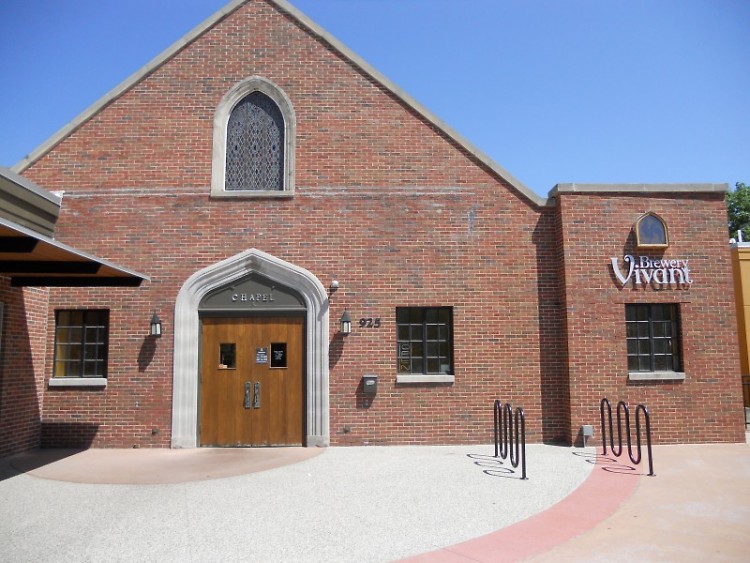This week Kris Spaulding, Co-Owner and Sustainability Director of Brewery Vivant discusses the environmental merits of canning beer instead of bottling it – the method traditionally preferred by most micro-breweries. Since opening in 2010, the popular Grand Rapids Brewery has received as much attention for its commitment to sustainable business practices as it has for its delicious, Belgian-style beer.
As Spaulding explains, cans present a more environmentally friendly alternative to bottles for a variety of reasons. “Aluminum is so easily recyclable…. If you look at the statistics that are out there, the money earned from recycling aluminum actually pays for the recycling of other commodities, like plastic, so it almost subsidizes it,” she said. Distributing beer in cans also allows Brewery Vivant to use 62.5% less packaging material because they can be stacked more easily than bottles, and more cans are able to fit onto a single pallet for shipping.
Sustainability is at the center of Brewery Vivant’s business model. “The way we look at sustainability is really focusing on the health of our environment and our impact on it, the health of our community, and of course the financial aspect of it,” said Spaulding. Her answer reflects a commitment to the “triple bottom line,” which seeks to measure the success of a company based on its social contributions and environmental impact in addition to its profit margin.
One of the very first decisions that Brewery Vivant made was to purchase brewery equipment from Wisconsin, rather than China because they wanted to spend their money as locally as possible. Brewery Vivant is the only LEED-Certified (Leadership in Energy and Environmental Design) brewery in the United States. The brewery obtained a LEED Silver certification through a variety of factors including locating their business in a walkable community, offsetting 100% of their electrical usage with renewable energy credits, and installing energy-efficient heating and cooling systems.
To learn more about Brewery Vivant’s commitment to sustainability, check out their first annual sustainability report. You can also hear this week’s episode of A Watershed Moment online.
A Watershed Moment
“A Watershed Moment” is a weekly radio program focused on environmental news and happenings in West Michigan, plus solutions for living a greener life. Broadcast on WYCE-FM 88.1 on Tuesdays at 8:30am and 5:30pm, this program is produced by Grand Rapids Community Media Center and West Michigan Environmental Action Council.
The Rapidian, a program of the 501(c)3 nonprofit Community Media Center, relies on the community’s support to help cover the cost of training reporters and publishing content.
We need your help.
If each of our readers and content creators who values this community platform help support its creation and maintenance, The Rapidian can continue to educate and facilitate a conversation around issues for years to come.
Please support The Rapidian and make a contribution today.

